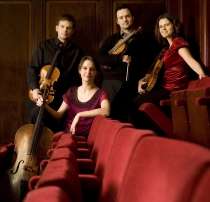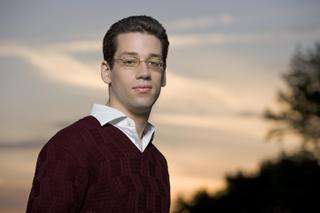|
Back
The Lighter Side of Dark Music New York
Zankel Hall, Carnegie Hall
04/02/2013 -
Wolfgang Amadeus Mozart: Piano Quartet in E-flat Major, K. 493
Leos Janácek: String Quartet Nr. 2, “Intimate Letters”
Timothy Andres: Piano Quintet (New York premiere)
Robert Schumann: Piano Quartet in E-flat Major, Opus 47
Jonathan Biss (Piano), Elias String Quartet: Sara Bitlloch, Donald Grant (Violins), Martin Saving (Viola), Marie Bitlloch (Cello)

The Elias String Quartet (© Benjamin Ealovega)
It comes as a minor jolt in the post-Kronos age of avant-garde string quartets when four nicely dressed, obviously pleasant quartet players come on stage and play works right out of the mainstream repertory. No 45-minute music out of blackness (ŕ la G.F. Haas), no Murail-style heavy textures, not even those old fogies like Feldman and Bartók on exhibition.
But the Elias String Quartet, with that dynamic pianist Jonathan Biss have been partners for several years, giving a concert of their favorites (Janácek and Schumann) over a week’s duration in Carnegie Hall. In fact, Mr. Biss, whose Janácek: piano music is amongst his most fascinating gifts, let the Elias Quartet take the composer for themselves, while he joined them in Mozart, Schumann and the one obligatory living composer.

J. Biss (© J. Katz/EMI Classics)
That “niceness” of the Elias Quartet was not much in their favor for the opening Mozart Piano Quartet, which belonged entirely to Mr. Biss. I realize that they have been playing together for several years, but last night we had two dissimilar Mozarts for the price of one. Jonathan Biss plunged ahead, with all the cool, sparkling piano runs at his command. Nothing was delicate or even sensitive in this Mozart piece. He simply let the piano roll with his ineffable florid touch, even giving that Larghetto movement more glitter than crystal in their beautiful runs.
That could have been tolerated had this been a solo performance. But no, three strings were playing a different Mozart, an 18th Century Mozart which was intimate, subdued, somehow too pretty. That too could have been tolerated, save for the last movement, which had some delicious Mozart humor, most of which was lost between the piano thunder, and the lightening sounds of the Elias.
Mr. Biss went offstage for the Janácek: Second String Quartet, the “happy” quartet, whose “intimate letters” told of possible joys, possible fulfillments. The Czech composer was never one to shun wearing his heart (as well as his art) upon his sleeves, and the Elias String Quartet plunged into the music with as much emotion as they were capable.
I have heard those glorious folk tunes played with more Central European oom-pah-pah earthiness, and have heard those little cries from viola and cello played with more plaintive mewing, and those repetitions, those strange ostinati played with more obsession. But that is not essential for the composer.
In fact, the only “secret” in playing Janácek is giving the illusion of absolute spontaneity. Thus, a solo pianist like Jonathan Biss can let his heart take over when he plays On An Overgrown Path. A string quartet is dependent upon themselves, so the spontaneous feeling, that Janácek: trick of writing music which seems to have no genesis, no impulse, no Germanic sense of structure and perfection, is almost impossible.
The Elias Quartet tried their best, and if it was a winning performance, it never even tackled the mystery behind the notes. It was light, bright, pleasant.

T. Andres (© Michael Wilson)
The single Carnegie Hall premiere was Timothy Andres’ Piano Quintet, the work of a young (not yet 30), Yale-educated, John Adams/California-influenced pianist/composer who is both extraordinarily clever, and has a great sense of humor.
What serious composer would dare write a companion suite of Schunann’s Kreisleriana called It Takes A Long Time To Become A Good Composer, or rewrite a Mozart concerto in his own notes?
This Piano Quintet, co-commissioned by Carnegie Hall, was a tour de force for both the Elias and Mr. Biss. His first movement had canons to the left of us, canons to the right of us, his “Boulder Pushing” movement was a Sysephusian challenge with piano rolling in the bass, and the strings pushing from above. I wouldn’t have known it from listening, but apparently the fourth movement was a piano solo “bouncing along in mirror motion, creating an aural image of a biconvex lens.” Nor did I see the score, which apparently was written like Medieval compositions, with a visual “succession of interlocking triangle-shaped lines”.
But Mr. Andres’ games today could be like exercises of an extremely talented musician, waiting for more serious works in the years to come.
Such a serious work was the final Schumann Piano Quintet, which merged the attempt at Mozartean perfection, though consciously lacking Schumann’s Janácek:-like emotion-pouring. The three Elias members with Mr. Biss let out all their emotional steam, playing a true concord of feelings to allow this dynamic, classically-structured work to actually bubble over with joy.
Harry Rolnick
|